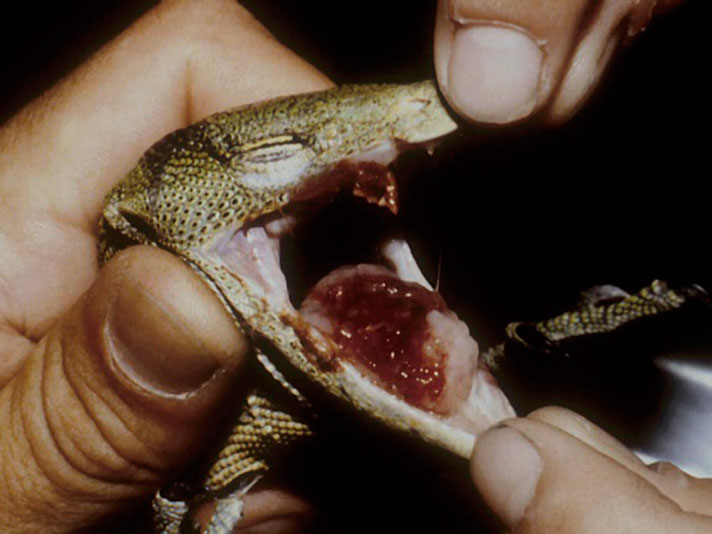Long-distance medicine is a reality, but it requires trained individuals on both ends of the cyber connection to collect all the data and formulate a diagnosis and plan.
The Internet has influenced our lives in so many ways. Of course, most of us could not image life without it—the Internet makes so many things possible. For me, I can now share information with other specialists around the world, with just a simple mouse click.

douglas mader, DVM
This monitor presented with a large mass in its mouth. The animal was treated with antibiotics for “mouth rot” but never got better. Why? It was not a bacterial problem, it was cancer.
For instance, I have an X-ray that I would like have a second opinion on. In a nano-second, I can send it to a board-certified radiologist and have it reviewed. No longer do I have to wait to send something out via Fed Ex, have it analyzed, and then get a faxed report back the next day.
This technology is invaluable for information exchange. Faster communication has translated to teaching, as well. I used to travel thousands of miles every year to teach classes at meetings and universities; now, I can do so from the comfort of my home or office.
Want To Learn More?
Recently, I conducted an online forum for a large herp group. There were several hundred participants in the chat room, following along with the discussion, and they actively participated in the question-and-answer portion afterward. I fielded dozens of questions from several, seemingly satisfied participants.
At one point, a herper submitted a question regarding his lizard, which had mouth rot. He told me that he was “very experienced” and did his own veterinary care (there were no veterinarians in his area that knew as much as he did, so he felt it was a waste of his time and money to go to a vet).
He posted that he had a savannah monitor, had treated it for mouth rot for six weeks using antibiotics, and it did not respond. His forum question: What other types of antibiotics should he use?
I asked him several questions about his lizard, such as what species it was, how old it was, the gender, what did it eat, how was it housed (caging, temperature, humidity), its diet, what was its water source, etc. You get the idea.
He said it didn’t matter; he just needed to know what other antibiotic he could try.
I asked him for the results of the microbiological culture and sensitivity tests on the diseased tissue.
He said that he didn’t need that, just the name of a stronger antibiotic.
I asked him what he meant by stronger? Stronger as in concentration, ability to penetrate tissue, “kill power” or what?
He said, “just stronger” than the one he was using.
I asked what other supportive care he was providing to the lizard to protect it against any potential side effects of the drug. For instance, was he giving any fluids, gastroprotectants, etc.
He said, yes (duh), he was soaking the lizard.
Ok, not that soaking the lizard does a bit of good, but was he sure that this was actually an antibiotic-sensitive issue?
“Yes!” He told me that he’d seen this a number of times before and all it needed was a stronger antibiotic. I could tell by the terse responses that I was reading he was getting really frustrated with me.
I told him that I really wanted to help him and his lizard, but I needed some more information. I asked how he knew it really was an antibiotic-sensitive problem? He already admitted that he had not done any bacteriology testing. Had he done any tissue cytology? Did he get a biopsy to rule out other causes of inflamed tissue, such as gout, tumor, etc.? Perhaps it was not responding to antibiotics because it was not a bacterial disease.
At that, he posted that I was an “Ass” and signed off. Ouch. I guess I did not know enough to answer his question.
Even with all the technology available on the Internet, it really is not possible to make an accurate diagnosis without the benefit of a complete and thorough history evaluation and physical examination. Yes, long-distance medicine is a reality, but it requires trained individuals on both ends of the cyber connection to collect all the data and formulate a diagnosis and plan. It is not as simple as “needing a stronger antibiotic.”
Many diseases look similar. Many diseases are not a simple, single-layer problem. Most of the time, there are several layers of issues that overlap, and all of them must be addressed and corrected for the patient to heal.
True, many conditions do respond well to antibiotics. True, that in some cases, if an antibiotic does not work, a different one may work better. However, bacterial sensitivity testing is always the gold standard for determining the appropriate choice of drug – you want the most effective with the least side effects for the patient.
The Internet is a great source of information and avenue for health advice, but, don’t let it replace the real thing—an actual doctor visit.
Douglas R. MADER, MS, DVM, DABVP (REPTILE/AMPHIBIAN), is a graduate of the University of California, Davis. He owns the Marathon Veterinary Hospital in the Conch Republic, and is a world-renowned lecturer, author and editor. He sits on the review boards of several scientific and veterinary journals.


